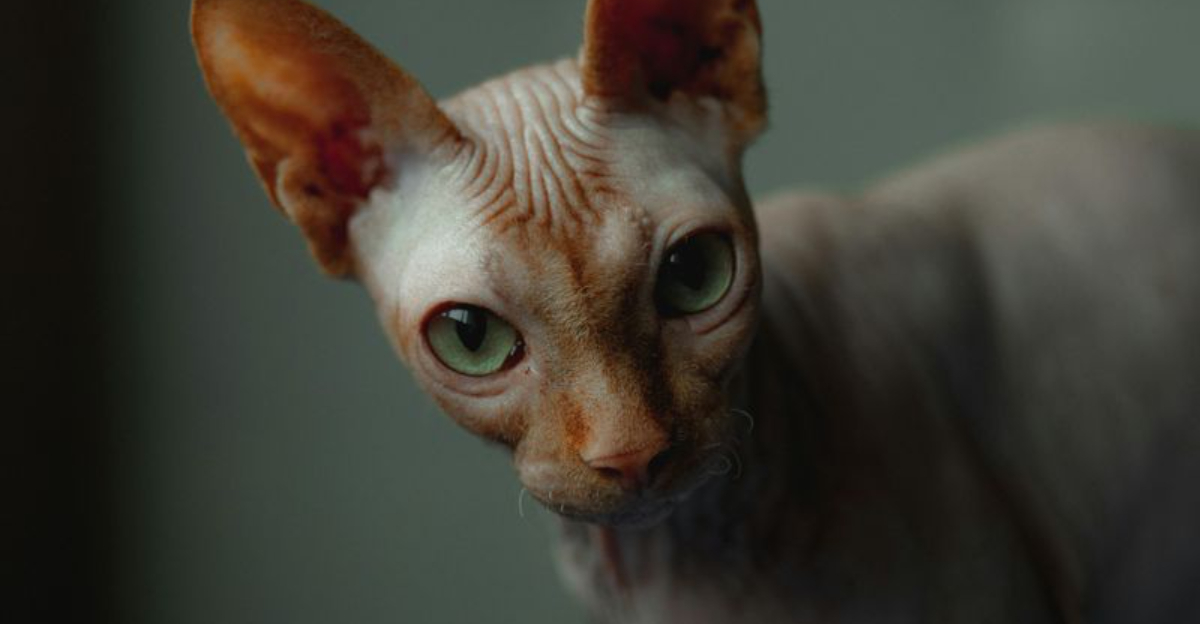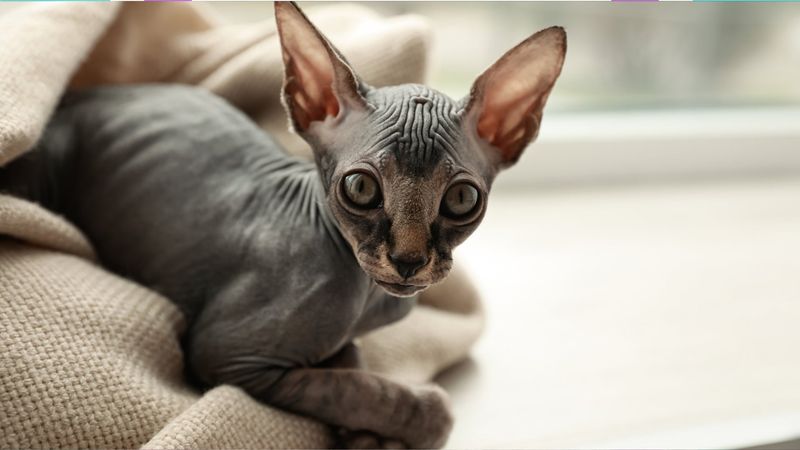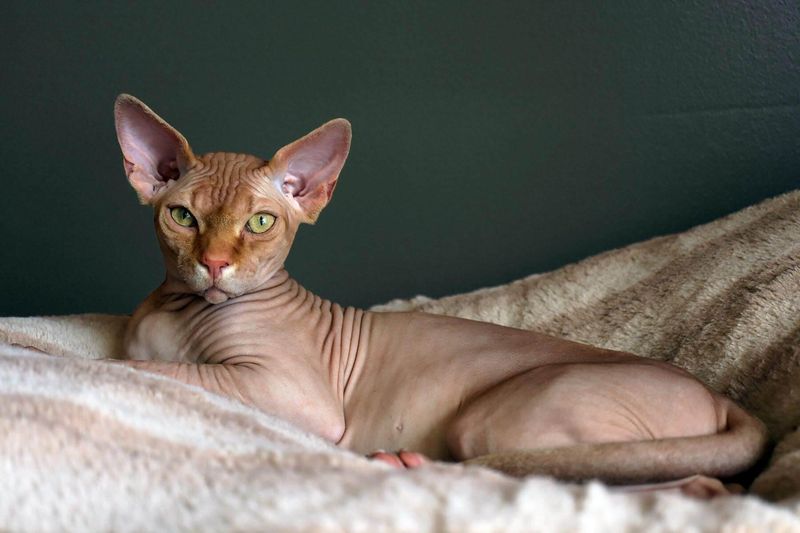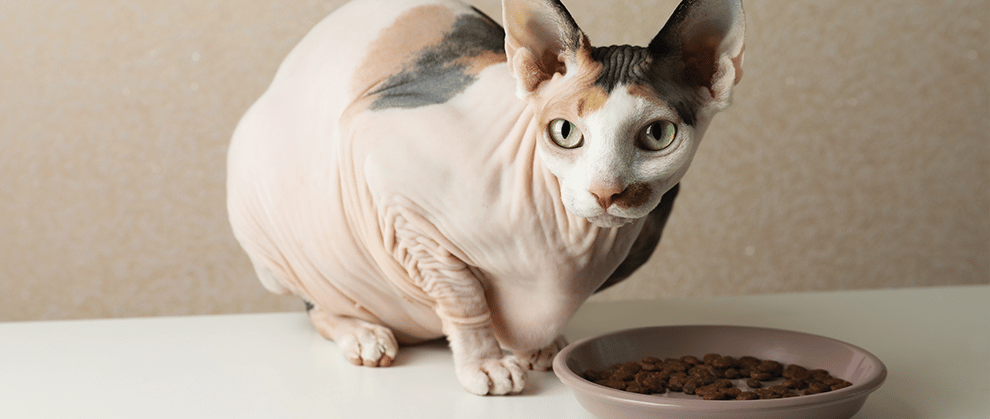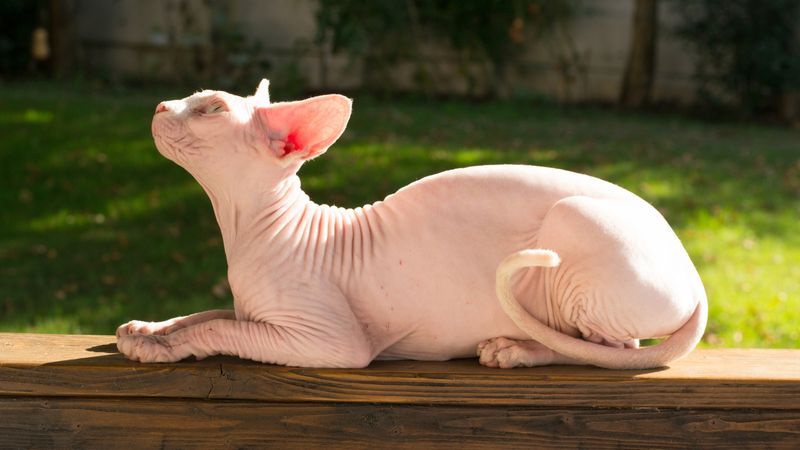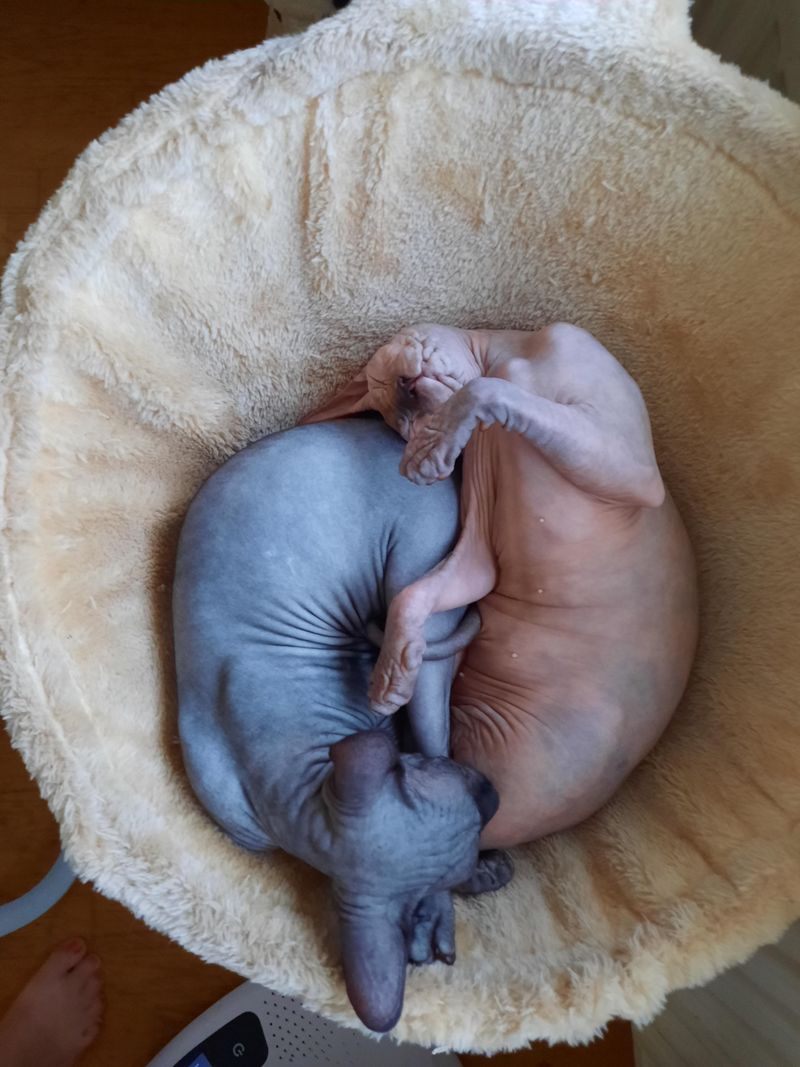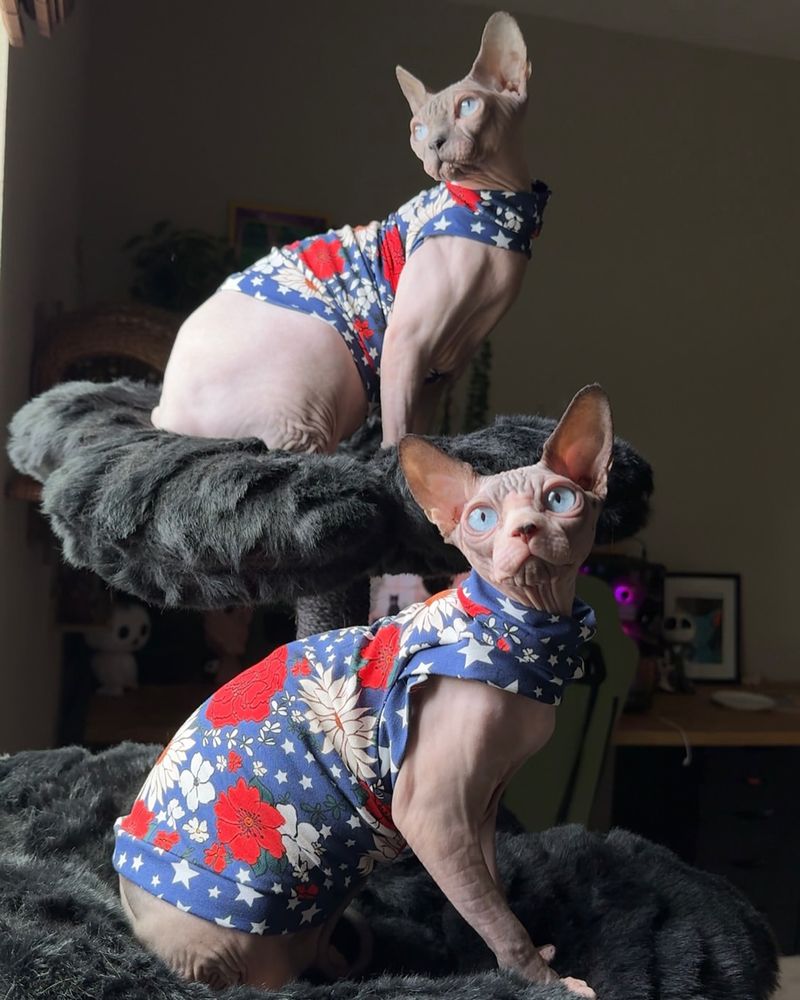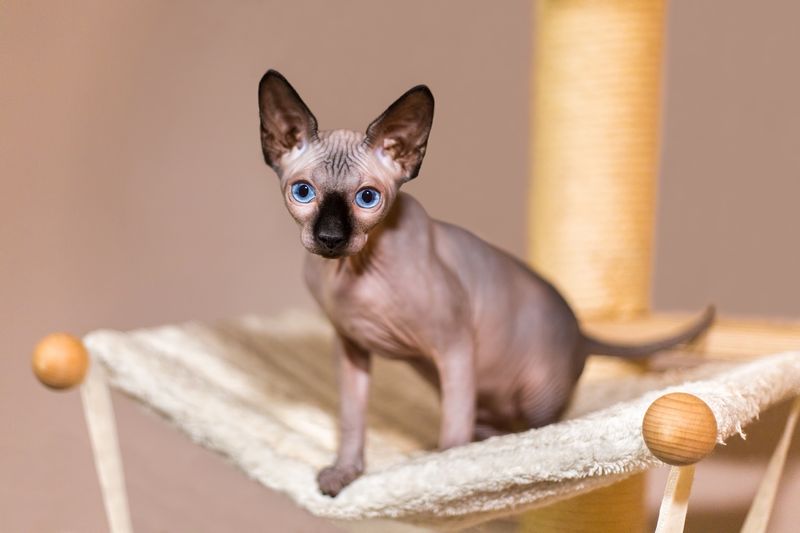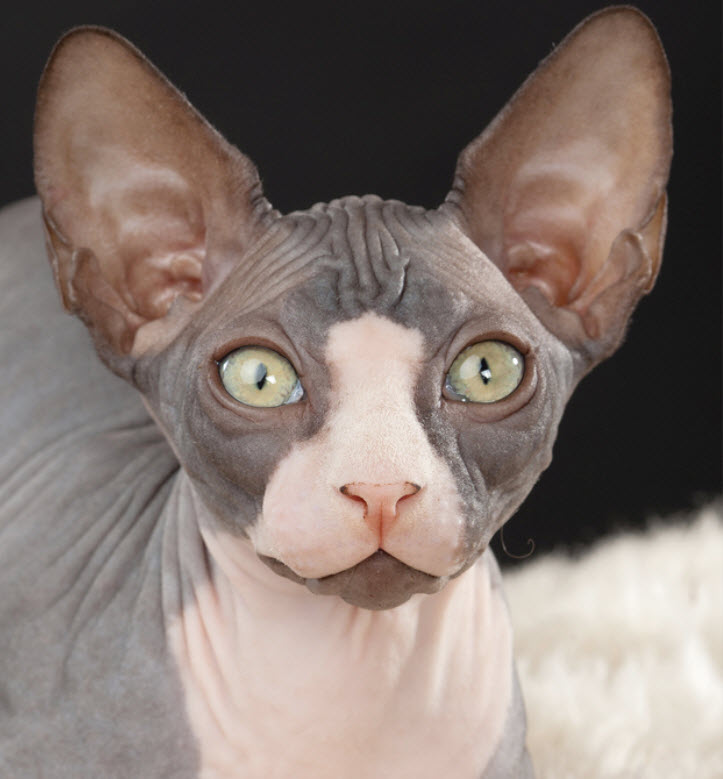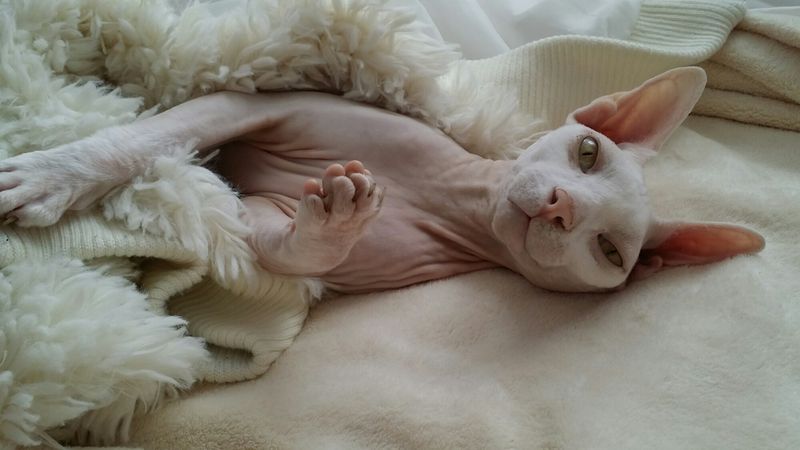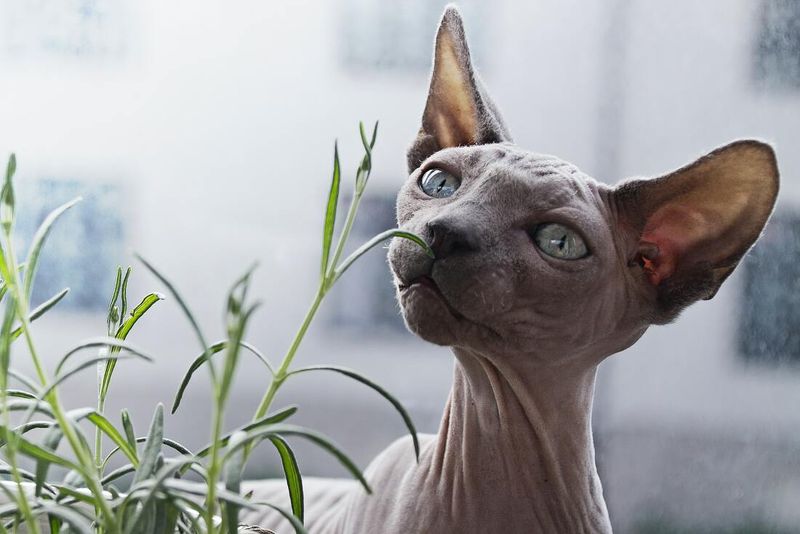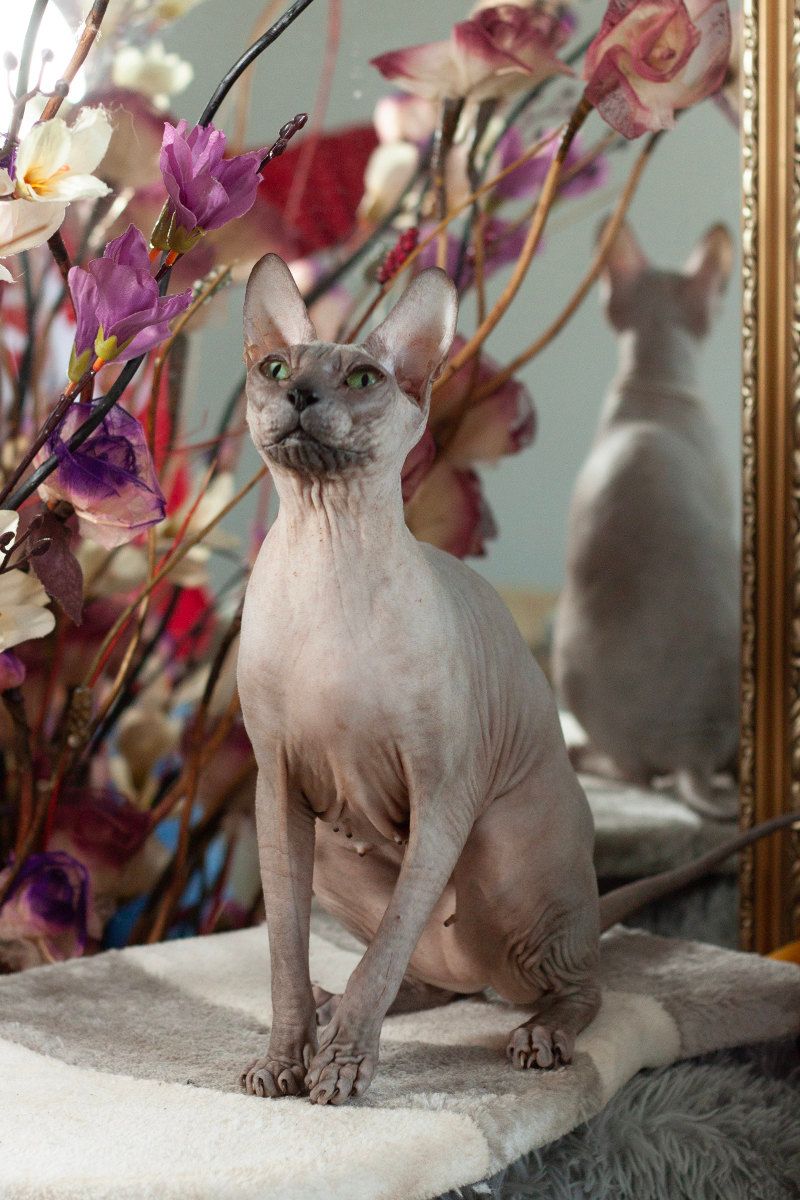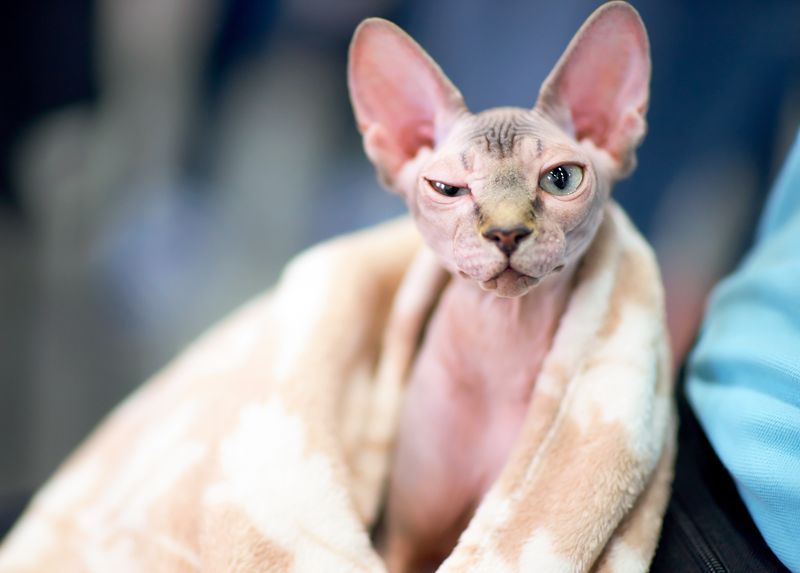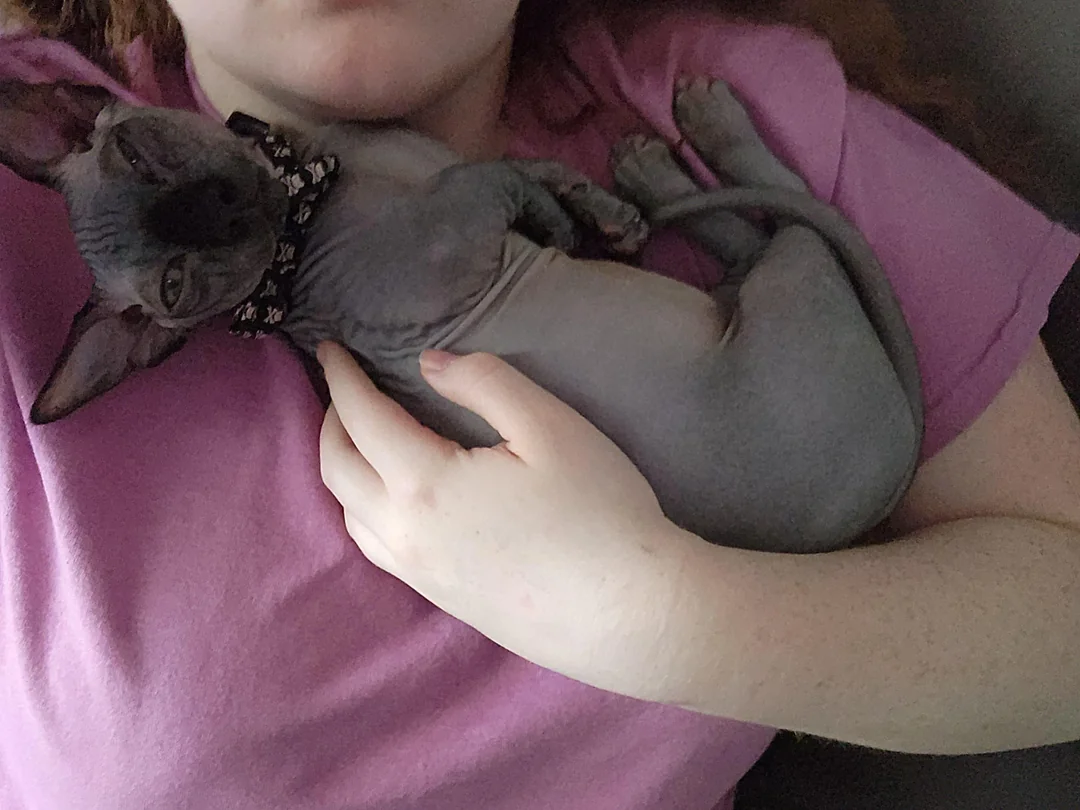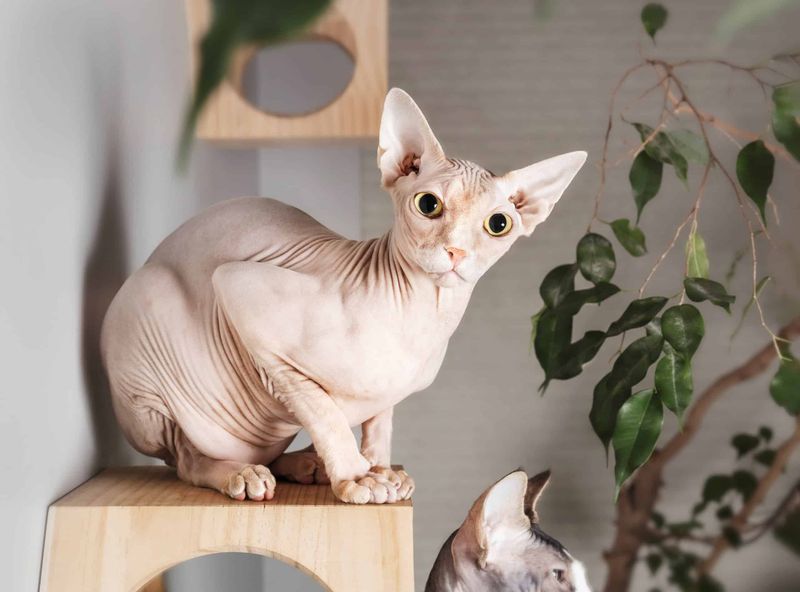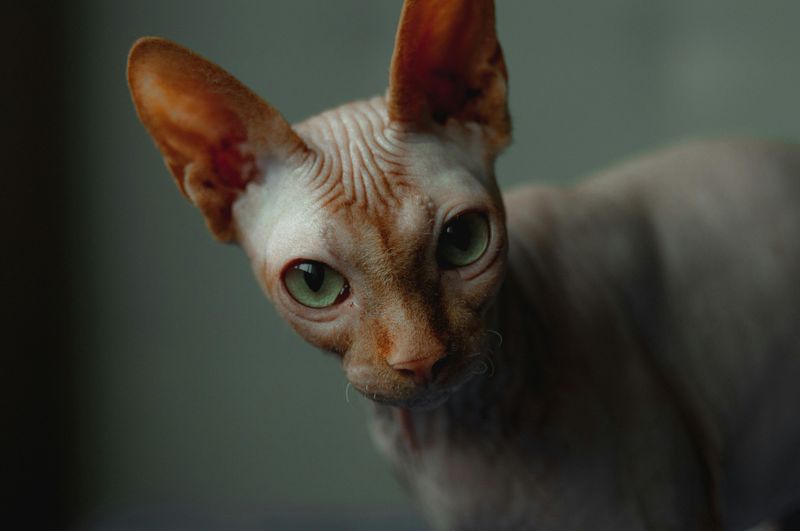📖 Table of Content:
- 1. They Aren’t Actually “Hypoallergenic”
- 2. Their Skin Is Like a Peach—But Needs Special Care
- 3. No Fur? No Problem! They Run Hot
- 4. Sunburn Is a Real Threat
- 5. They’re Little Space Heaters
- 6. Clothing Is Cute—But Not Always Necessary
- 7. Their Ears Get Super Dirty
- 8. They Need Extra Eye Care
- 9. Sphynx Cats Are Clingy (In the Best Way!)
- 10. They Have a Strong Immune System—But Some Risks
- 11. They Love to Be the Center of Attention
- 12. Wrinkles Need Washing!
- 13. They Hate Being Alone
- 14. They’re Surprisingly Athletic
- 15. They’re One of the Most Lovable Cat Breeds Ever
Sphynx cats are one of the most distinctive feline breeds, known for their hairless appearance and velvety, peach-like skin. Despite their lack of fur, they come in a variety of skin colors and patterns, making each cat unique. Their large ears, wrinkled skin, and expressive eyes add to their striking look, making them a favorite among cat enthusiasts. These cats are often warm to the touch, as they rely on body heat rather than fur to stay warm.
Beyond their unusual appearance, Sphynx cats are incredibly active and playful, displaying remarkable agility and curiosity. They love climbing, jumping, and exploring their surroundings, making them a lively addition to any home. Their affectionate nature makes them highly social, often seeking attention from their owners and even following them around the house. Because of their strong bond with humans, they are sometimes referred to as “velcro cats,” always eager for cuddles and companionship.
Caring for a Sphynx cat requires some special attention due to their hairless nature. Without fur to absorb oils, their skin needs regular cleaning to prevent buildup and irritation. They also require warmth, often seeking cozy spots or even wearing pet-friendly sweaters during colder months. Additionally, their ears and paws need frequent cleaning to avoid infections. Despite these extra care requirements, Sphynx cats bring immense joy to their owners with their loving and playful personalities.
1. They Aren’t Actually “Hypoallergenic”
Misconceptions about Sphynx cats being hypoallergenic have led many allergy sufferers to believe they’re the perfect pet. However, they still produce Fel d 1, the protein responsible for cat allergies, just like their furry counterparts. The difference is that without fur, they don’t trap as much dander, so it spreads differently in the environment. Some allergy sufferers find Sphynx cats easier to tolerate, but others may still experience reactions from their saliva and skin oils. Frequent bathing and wiping down their skin can help reduce allergen buildup, making them more manageable for sensitive owners. Air purifiers and proper cleaning routines also help minimize allergic reactions. So, while they may be a better option than long-haired breeds, Sphynx cats are not a guaranteed allergy-free pet.
2. Their Skin Is Like a Peach—But Needs Special Care
Smooth, warm, and soft, a Sphynx cat’s skin is one of its most unique features. Without fur to absorb natural oils, their skin becomes greasy much faster than other cats. This means they require regular baths, typically once a week, to prevent dirt buildup and acne. If not cleaned properly, oil can clog their pores, leading to blackheads or skin infections. Using gentle, unscented cat shampoos is essential to avoid skin irritation. Overbathing, however, can strip their skin of natural oils and cause dryness. Finding a balance in their skincare routine is key to keeping their skin smooth and healthy.
3. No Fur? No Problem! They Run Hot
Sphynx cats have a unique metabolism that works overtime to keep them warm. Without an insulating coat, they naturally burn more calories to maintain body temperature. This means they tend to eat more than their furry counterparts and have a hearty appetite. Owners may notice their Sphynx always looking for snacks or seeking warm places to curl up. Their warm bodies make them excellent lap cats, as they love sharing body heat with their humans. Because of their fast metabolism, a high-protein diet is essential for keeping them healthy and energized. Providing warm spots, like heated beds or cozy blankets, ensures they stay comfortable, especially in colder months.
4. Sunburn Is a Real Threat
Without fur as protection, a Sphynx cat’s delicate skin is highly vulnerable to sunburn. Direct sunlight can cause painful burns, leading to peeling, redness, and even long-term skin damage. Indoor sun exposure through windows can also be harmful, as UV rays still penetrate glass. If your Sphynx enjoys sunbathing, keeping them in shaded areas or applying pet-safe sunscreen is crucial. Prolonged exposure to the sun can also increase their risk of developing skin conditions over time. Light-colored or pink-skinned Sphynx cats are particularly susceptible to burns. Limiting outdoor exposure and ensuring they have plenty of shaded rest areas will help keep their skin protected.
5. They’re Little Space Heaters
One of the most charming things about Sphynx cats is how warm their skin feels to the touch. Their body temperature runs slightly higher than most cat breeds, making them feel like living heating pads. Because they don’t have fur to trap heat, they often seek warmth from people, blankets, and even electronics. You’ll often find them burrowing under covers, snuggling into their owner’s sweaters, or resting on a laptop for warmth. This love for heat means they are prone to getting cold, especially in the winter months. Owners should provide heated pet beds, warm blankets, and cozy spots around the house. While their warmth makes them excellent cuddle companions, it also means they need extra protection from cold drafts.
6. Clothing Is Cute—But Not Always Necessary
Dressing up a Sphynx cat in tiny sweaters and hoodies may seem adorable, but it’s not always the best idea. While they do get cold more easily than furry cats, their body heat and activity levels usually keep them comfortable indoors. Too much clothing can actually cause skin irritation, leading to rashes or discomfort. Tight-fitting outfits may trap oils and dirt against their skin, increasing the risk of acne or infections. If clothing is necessary for warmth, it should be made of soft, breathable fabric and fit loosely. Some Sphynx cats dislike wearing clothes altogether and may try to wriggle out of them. Instead of relying on clothing, providing a warm home environment is usually the best way to keep them cozy.
7. Their Ears Get Super Dirty
Without fur to filter out debris, Sphynx cats’ ears accumulate dirt and wax much faster than other breeds. If not cleaned regularly, the buildup can lead to blockages, infections, or discomfort. Owners should gently clean their ears once a week using a damp cloth or a vet-approved ear cleaner. Harsh cotton swabs should be avoided, as they can push wax further into the ear canal. Signs of ear infections include redness, excessive scratching, or a foul smell. Keeping their ears clean prevents bacteria from growing and ensures their hearing stays sharp. A consistent cleaning routine is key to maintaining healthy ears for a Sphynx cat.
8. They Need Extra Eye Care
Because Sphynx cats lack eyelashes, their eyes are more exposed to dust, dirt, and other particles. This often causes them to produce extra tears to naturally flush out irritants. While their watery eyes are usually harmless, excess tearing can sometimes lead to staining around their eyes or mild infections. Owners should gently wipe their cat’s eyes with a soft, damp cloth to remove any discharge. If persistent irritation or swelling occurs, a vet visit may be necessary. Regular eye care helps prevent discomfort and keeps their eyes clear and bright. Since their eyes are more exposed, ensuring a clean environment can help minimize irritation.
9. Sphynx Cats Are Clingy (In the Best Way!)
Unlike many independent cat breeds, Sphynx cats crave human interaction and love being the center of attention. Their affectionate nature makes them follow their owners from room to room, always wanting to be involved in whatever is happening. They enjoy perching on shoulders, curling up on laps, and sleeping in bed with their humans. Because they bond so closely, they don’t do well with being left alone for long periods. If left without companionship, they may develop separation anxiety or destructive behaviors. A second pet or plenty of interactive toys can help keep them entertained when their owner is away. Their strong need for affection makes them some of the most loving and engaging cats to own.
10. They Have a Strong Immune System—But Some Risks
Despite their hairless appearance, Sphynx cats generally have a robust immune system. However, they are prone to certain genetic conditions, including hypertrophic cardiomyopathy (HCM), a common heart disease in cats. Regular veterinary checkups, including heart screenings, are important for early detection and management. Due to their lack of fur, they are also more susceptible to minor cuts, scrapes, and skin infections. Maintaining proper hygiene and a balanced diet helps support their immune health. High-quality food rich in omega-3 fatty acids can improve skin resilience and overall well-being. With proper care, Sphynx cats can lead long, healthy lives despite their unique vulnerabilities.
11. They Love to Be the Center of Attention
Sphynx cats thrive on human interaction and love being in the spotlight. They are naturally social and will often greet guests at the door, follow their owners around, and even try to “help” with daily tasks. Because of their affectionate nature, they need a lot of attention to stay happy and mentally stimulated. If ignored or left alone too often, they may resort to mischievous behaviors like knocking things over or meowing loudly for attention. Their playful and dog-like tendencies make them great companions, but they require an owner who can dedicate time to bonding with them. Interactive play, puzzle toys, and daily cuddles help keep them entertained. A well-loved Sphynx cat is a happy and emotionally healthy one.
12. Wrinkles Need Washing!
The adorable folds and wrinkles of a Sphynx cat aren’t just cute—they also trap dirt, oil, and bacteria. Unlike furry cats, whose coats help wick away excess oil, Sphynx cats rely entirely on skincare to stay clean. If their wrinkles are not wiped down regularly, they can develop acne, infections, or unpleasant odors. Using a soft, damp cloth or pet-safe wipes, owners should clean between their folds at least a few times a week. Special attention should be paid to areas like the neck, underarms, and belly, where dirt accumulates the most. If neglected, moisture and bacteria buildup can cause painful sores or rashes. Keeping their skin clean is a crucial part of their health routine.
13. They Hate Being Alone
Unlike some independent cat breeds, Sphynx cats are highly social and do not tolerate being left alone for long periods. They form strong bonds with their owners and can become anxious or depressed if they don’t receive enough companionship. If left alone too often, they may develop destructive habits, such as excessive scratching, crying, or chewing on household items. To keep them emotionally healthy, owners should consider adopting another pet or providing plenty of interactive toys. Even leaving the TV or radio on while they are alone can help them feel less isolated. Spending quality time with them through cuddling, play, and interaction is essential for their well-being. A lonely Sphynx is an unhappy Sphynx, so companionship is key to their happiness.
14. They’re Surprisingly Athletic
Despite their delicate appearance, Sphynx cats are incredibly strong and agile. They have muscular bodies and are known for their love of climbing, jumping, and racing around the house at high speeds. Many owners are surprised by their high energy levels and playful nature, which can rival that of a kitten even in adulthood. To stay healthy, they need plenty of physical activity, so cat trees, tunnels, and interactive toys are great investments. If they don’t get enough exercise, they may become restless or develop weight-related health issues. Their athleticism also means they enjoy games like fetch, making them one of the most dog-like cat breeds. Keeping them active is essential for both their physical and mental health.
15. They’re One of the Most Lovable Cat Breeds Ever
Sphynx cats may require extra care, but their affectionate and playful personalities make every effort worthwhile. They are known for their deep loyalty, often forming an unbreakable bond with their owners. Their love of cuddling, constant companionship, and goofy antics bring endless joy to those who own them. Many people describe them as “Velcro cats” because of how much they cling to their humans. Their intelligence and curiosity also make them engaging and fun pets, always finding new ways to entertain themselves and their owners. Despite their unique needs, they are one of the most rewarding cat breeds to care for. For those willing to put in the effort, a Sphynx cat offers a lifetime of love, warmth, and companionship.
